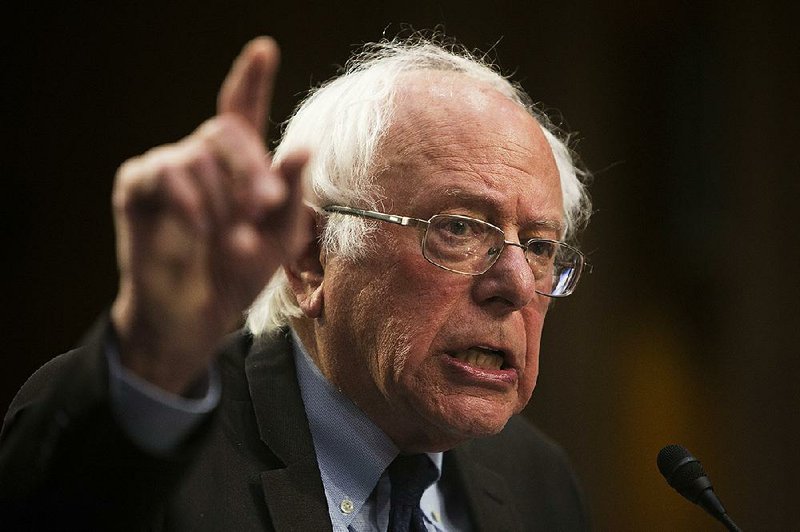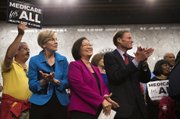WASHINGTON -- In a campaign-style rally, Sen. Bernie Sanders on Wednesday proposed what he called "a Medicare-for-all, single-payer health care system" -- a proposal embraced by liberal activists hoping to steer the Democratic Party in future elections.
The Vermont independent's plan would hand the government a dominant role in insuring Americans, a crucial step, he said, in guaranteeing health care for all. Census Bureau data this week showed the proportion of people lacking policies falling to 8.8 percent last year under the Patient Protection and Affordable Care Act, the lowest level ever recorded, but Sanders called it an "international disgrace" that not all Americans have coverage.
Though Sanders' plan is going nowhere in the current GOP-controlled Congress, he drew a crowd to a packed and electrified Senate hearing room where he introduced the bill.
Hours earlier, Republican senators unveiled their own last-ditch, long-shot plan to scuttle President Barack Obama's 2010 statute and called on the White House to help.
"Pick up the phone" and ask governors to support the repeal effort, said Sen. Lindsey Graham, R-S.C., aiming his remarks at President Donald Trump. "Tell them this matters to you, that you weren't kidding about repealing and replacing Obamacare, that you actually meant it."
Shortly afterward, Trump issued a statement saying "I sincerely hope" the effort led by Graham and Sen. Bill Cassidy, R-La., will succeed.
The waning desire of GOP lawmakers to revive their failed effort to scrap Obama's law contrasted with growing, though wary, Democratic support for Sanders' bill. It has attracted 16 co-sponsors, one-third of all Senate Democrats, though most are from safely Democratic states.
"Today we begin the long and difficult struggle to end the international disgrace of the United States, our great nation, being the only major country on earth not to guarantee health care to all," Sanders declared.
Though his bill has no chance in the current Congress, the effort is backed by large segments of a Democratic Party hoping to win House control in the 2018 elections. Sanders caucuses with Democrats and unexpectedly gave Hillary Clinton a tough run for the party's presidential nomination last year.
The room where Sanders spoke held more than 200 people, including members of unions and progressive groups. Many waved posters and chanted "Medicare for all," the name he uses for his 96-page bill, which would gradually expand the health insurance program for the elderly to cover all Americans.
Nine other senators attended, and most also spoke. Sen. Cory Booker, D-N.J., called the health care battle "a fight for our nation to live up to our ideals."
Calls for universal coverage and government-administered, single-payer health care have simmered among Democrats for decades.
The notion was submerged as Obama enacted his overhaul, which boosted federal spending and set coverage requirements but left much of the existing private system in place. About 156 million people get policies at work, about half of all those insured, with most of the rest getting coverage through Medicare or Medicaid or by buying individual plans.
But support among Democrats for Sanders' bill and similar measures by other Democrats, plus polling that shows increasing public backing, suggests the push for a single-payer system will be a major theme inside the party.
"We will defend it at every turn," Sen. Elizabeth Warren, D-Mass., told the crowd, referring to Obama's law. "But we will go further."
Sens. Kirsten Gillibrand of New York and Kamala Harris of California also attended the event.
Many Democrats from politically competitive states have shied away from Sanders' plan, aware that Republicans are ready to cast it as a huge tax increase and as government-run health care.
"Bernie Sanders is introducing his Medicare-for-all bill," said Sen. John Barrasso, R-Wyo. "It seems that this complete government takeover of health care is becoming the litmus test for the liberal left."
A day earlier, House Minority Leader Nancy Pelosi, D-Calif., dismissed Sanders' bill, saying her immediate goal is to protect the Affordable Care Act from Trump's efforts to dismantle it.
Sanders provided no details about the price tag of his measure or how it would be financed. Aides have said it would likely rely largely on income-adjusted premiums people would pay the government, ranging from zero for the poorest Americans to high levies on the rich and corporations.
People would no longer owe monthly premiums and other out-of-pocket costs like copayments, and companies would not have to offer coverage to workers. Sanders said most people and employers would save money.
The version he introduced during his 2016 presidential run was estimated to cost $1.4 trillion annually.
His plan would surpass Obama's law in covering a long list of services, including dental, vision, hospital, doctors and mental health costs. Copayments would be allowed for prescription drugs.
"The president as well as the majority of the country knows that the single-payer system that the Democrats are proposing is a horrible idea," said White House spokesman Sarah Huckabee Sanders. "I can't think of anything worse than having government being more involved in your health care instead of less involved."
At the rally, Sanders predicted that "insurance companies, drug companies and Wall Street won't like this legislation," and he was right.
David Merritt, an executive vice president of America's Health Insurance Plans, a lobby for insurers, said: "Whether it's called single-payer or Medicare for all, government-controlled health care cannot work. It will eliminate choice, undermine quality, put a chill on medical innovation and place an even heavier burden on hardworking taxpayers."
GOP'S LATEST TRY
In the GOP's latest proposal, many of the Affordable Care Act's subsidies and coverage requirements would be erased and instead block grants would be provided to states to help individuals pay for coverage.
Graham and Cassidy struggled for weeks to round up sufficient support for their package, although Sens. Ron Johnson, R-Wis., and Dean Heller, R-Nev., signed on.
Under the Graham-Cassidy bill, money would be distributed on the basis of a complex formula using metrics such as the regional cost of living.
The block grants would replace federal money now being spent under the Affordable Care Act for the expansion of Medicaid, for premium tax credits and for subsidies that reimburse insurers for reducing out-of-pocket costs for low-income people.
The Graham-Cassidy bill includes many features of earlier Republican bills. It would repeal the Affordable Care Act's requirements for most Americans to have coverage and for larger employers to offer it and would also eliminate a tax on medical devices.
In addition, the Graham-Cassidy bill would make deep cuts in Medicaid, putting the entire program on a budget and ending the open-ended entitlement that now exists. States would receive a per-beneficiary allotment of federal money.
But time is running out on the bill. After Sept. 30, the Graham-Cassidy legislation would lose procedural protections that allow passage in the Senate with a simple majority rather than the 60 votes often required for major legislation.
Even with those protections, Sen. John Cornyn of Texas, the No. 2 Senate Republican, said he had seen no evidence that the bill had the 50 votes needed to win approval in the Senate in the next two weeks. And he noted that it had not been analyzed by the Congressional Budget Office, which could take a week or two to estimate how much the bill would cost and how many people would lose or gain coverage. The budget office said millions of people would lose coverage under earlier Republican repeal bills.
Other senators, too, were not rushing to embrace the new repeal push. Sen. John Thune, R-S.D., compared the bill's chances for passage to "a double bank shot."
Republicans lost the votes of three of their 52 senators in July on legislation aimed at a health law repeal.
BIPARTISAN EFFORT
Meantime, a bipartisan group of senators forged ahead with their plan to stabilize health insurance markets and control rising premiums.
That effort, spearheaded by Senate Health Committee Chairman Lamar Alexander, R-Tenn., and Sen. Patty Murray of Washington, the senior Democrat on the committee, has spawned an unusual outbreak of harmony between Republicans and Democrats over the past several weeks.
Republicans and Democrats on the health panel have voiced support for funding monthly payments to insurers that help them offer lower copays and deductibles to millions of low-income consumers.
The uncertainty over these so-called cost-sharing reduction payments -- which the Trump administration has repeatedly threatened to withhold -- has prompted numerous insurers around the country to warn that they must raise premiums by double digits next year to account for the possibility that they won't get the federal assistance.
Governors and state insurance regulators from both parties, as well insurance industry officials, have called on Congress to end the uncertainty.
Tennessee's regulator, Republican Julie McPeak, last week told the Senate Health Committee that assuring consistent cost-sharing payments is "the single most important issue" to stabilizing markets.
Senators from both parties also have expressed interest in setting up new systems to protect insurers from big losses if they are hit with very costly patients.
Such reinsurance systems are used in other marketplaces such as the Medicare Part D prescription drug program and are seen as critical to controlling premiums.
But several senior Republicans -- including Senate Finance Committee Chairman Orrin Hatch of Utah -- have derided additional cost-sharing payments as a "bailout" for the insurers.
And many GOP lawmakers are demanding that Congress agree to give states greater flexibility to waive requirements in the 2010 health care law dictating minimum standards for what health insurance should cover.
"There still are significant differences to deal with," Alexander warned Tuesday, noting the importance to Republicans of granting states more power, which many conservatives believe could help lower costs.
"A true compromise requires Democrats to accept something that Republicans want -- more flexibility for states -- and Republicans to accept something that Democrats want: continued funding for cost-sharing payments in the Affordable Care Act," Alexander said.
Information for this article was contributed by Alan Fram and Kevin Freking of The Associated Press; by Robert Pear of The New York Times; and by Noam N. Levey, Lisa Mascaro and Brian Bennett of the Tribune News Service.
RELATED ARTICLE
http://www.arkansas…">Arkansas' uninsured fall below U.S. rate
A Section on 09/14/2017


